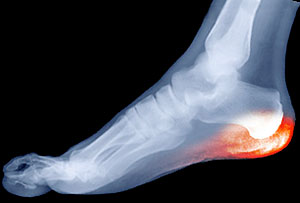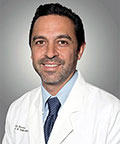- Home
- Foot & Ankle Conditions
- Pediatric Conditions
- Calcaneal Apophysitis
Calcaneal Apophysitis (Sever's Disease): causes, symptoms and treatments

What is Sever's disease (calcaneal apophysitis)?
Calcaneal apophysitis (more commonly called Sever's disease) is a foot condition that predominantly affects children, especially those who are active in sports. In fact, Sever's disease is the most common cause of heel pain in young athletes.
It commonly presents as unexplained heel pain that isn't the result of trauma. Because many things can cause heel pain, it’s important to consult with a trained pediatric podiatrist to find the root of your child’s heel pain. While it could just be overuse or strain, it could also be Sever’s disease.
- What causes Sever's disease?
- What are the symptoms of calcaneal apophysitis?
- What are some risk factors for Sever’s disease?
- Diagnosing Sever's disease
- What is calcaneal apophysitis treatment?
- Recovering from Sever's disease
- UFAI is here to help with pediatric foot and ankle conditions
- Sever's disease FAQs
- Can you play sports with Sever's disease?
- Can adults get Sever's disease?
- Can Sever's disease cause knee pain?
- Can Sever's disease cause permanent damage?
- Does Sever's disease stunt growth?
- How long does Sever's disease usually last?
- Is plantar fasciitis the same as Sever's disease?
- Is Sever's disease hereditary?
-
Foot and Ankle Surgeon and Director of University Foot and Ankle Institute
Dr. Bob Baravaria DPM, FACFAS is a Board-Certified Podiatric Foot and Ankle Specialist. He is an assistant clinical professor at the UCLA School of Medicine and serves as Director of University Foot and Ankle Institute.
Dr. Baravarian has been involved in athletics his entire life and played competitive tennis in high school and college. He has an interest in sports medicine, arthritis therapy, and trauma/reconstructive surgery of the foot and ankle. He is also fluent in five languages (English, French, Spanish, Farsi, and Hebrew),
 After 15 years of surgery fear and bad big toe joints I could hardly walk for more than 10 minutes. I have visited many Dr.s bu...Steve N.
After 15 years of surgery fear and bad big toe joints I could hardly walk for more than 10 minutes. I have visited many Dr.s bu...Steve N. Overall, it was a great experience. I've been coming to Dr. Kellman for about a year and he and his staff are very helpful.Vanessa W.
Overall, it was a great experience. I've been coming to Dr. Kellman for about a year and he and his staff are very helpful.Vanessa W. ExcellentDebasish M.
ExcellentDebasish M. Everyone was friendly and professional.Victor L.
Everyone was friendly and professional.Victor L. Very efficient and an excellent serviceHorwitz J.
Very efficient and an excellent serviceHorwitz J. Chaos in the office checkin. We weren’t forewarned about the iPad data collection. That made me late for a following appointmen...Carl C.
Chaos in the office checkin. We weren’t forewarned about the iPad data collection. That made me late for a following appointmen...Carl C. I was very happy with the staff and the Doctor. I found the Doctor on the internet and sent a request for a consult through the...Kathleen V.
I was very happy with the staff and the Doctor. I found the Doctor on the internet and sent a request for a consult through the...Kathleen V. Dr Nalbandian is an exceptional doctor and person. The staff respectfully & compently delt with an issue I had regarding a prev...Karen M.
Dr Nalbandian is an exceptional doctor and person. The staff respectfully & compently delt with an issue I had regarding a prev...Karen M. Visiting the office is a pleasurable occurance.Thomas J.
Visiting the office is a pleasurable occurance.Thomas J. Dr Kelman and his staff are always wonderfully caring and respectful to my father who has Alzheimer's dementia.Erland E.
Dr Kelman and his staff are always wonderfully caring and respectful to my father who has Alzheimer's dementia.Erland E. You won't find a better podiatrist or foot and ankle surgeon anywhere. Dr franson and his staff are caring and kind. They go th...Michelle O.
You won't find a better podiatrist or foot and ankle surgeon anywhere. Dr franson and his staff are caring and kind. They go th...Michelle O. Thank you for being there for your patients.Dieter B.
Thank you for being there for your patients.Dieter B.
